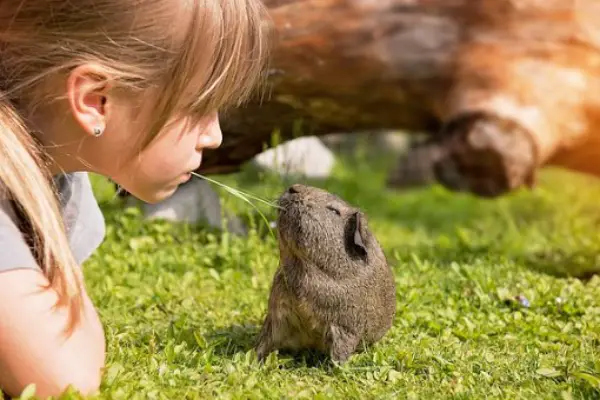10 Potential Reasons Guinea Pigs Bite & Tips
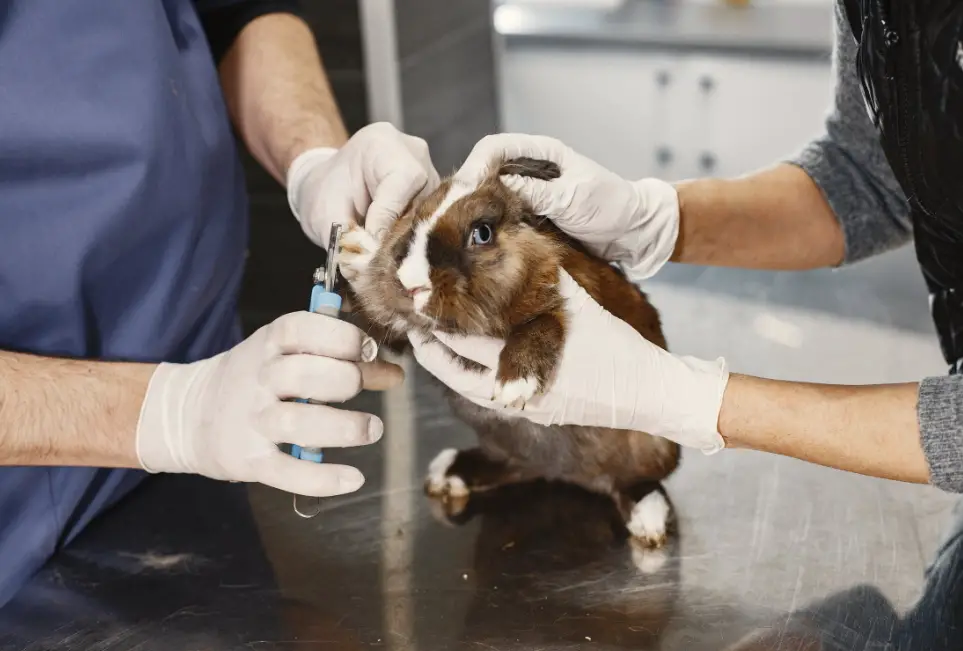
There are a lot of reasons why guinea pigs bite which we will be discussing all through this post.
Most of these reasons are solely based on the actions or activities of their owners around them.
Keep in mind that guinea pigs are prey animals, this means they are used as food for many wild animals.
So, biting is one way they tend to protect or defend themselves when attacked or in danger, so let’s proceed!
Why do guinea pigs bite
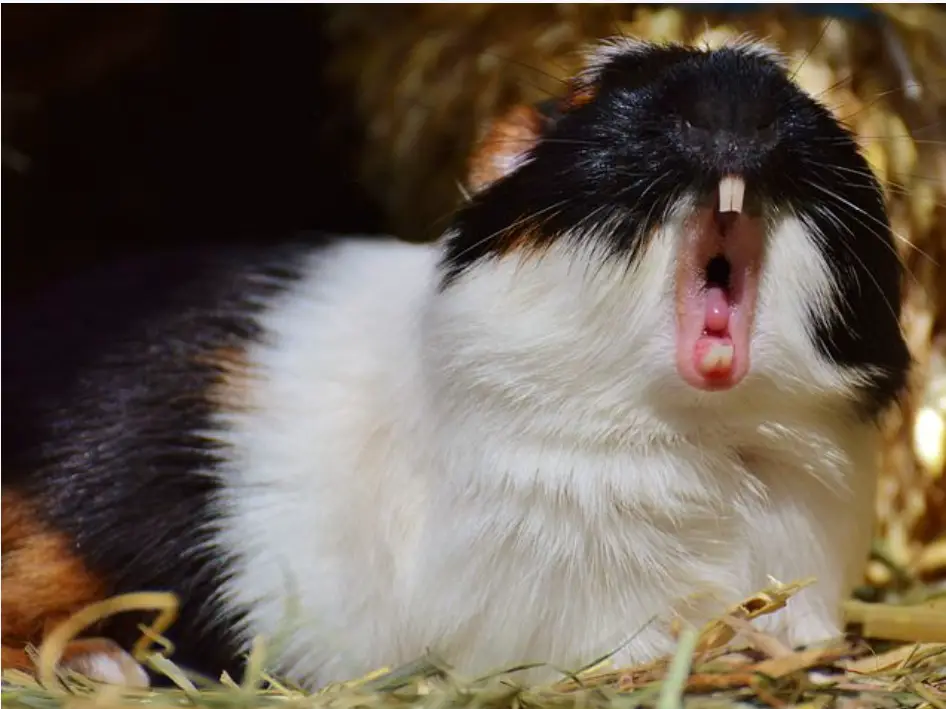
Guinea pigs very docile and rarely bite however, bite for various reasons including frustration, fear, feeling threatened, being startled, and disrupting their daily pattern, which causes irritation and protects themselves.
Here are some of the most common reasons why guinea pigs bite:
1. Frustration
It’s vital to remember that guinea pigs are predatory animals that might become upset or annoyed by certain behaviors.
Loud sounds and frequent changes in feeding schedules might cause a guinea pig to get frustrated, which can soon turn against you.
Not only may a dissatisfied guinea pig bite you, but it may also have a cage rage and try to escape which can pose a problem for you.
This type of frustration bite is usually unpleasant and can result in physical injury. Frustration in guinea pigs can cause a variety of problems for their owners.
Because loud noises and shifts in feeding schedules are two of the most typical sources of annoyance.
It’s a good idea to establish and keep to a daily plan of activities with your guinea pig.
To avoid unwanted habits, keep your guinea pig away from any loud noises and bright sunshine.
2. Defending themselves
Biting is the sole option for prey animals to defend themselves.
Guinea pigs are excellent hiders in the wild, and when confronted in captivity, they may bite to protect themselves.
One of the reasons they bite to defend themselves is the fear of being used as food by predators.
They may have seen or heard something that has made them uncomfortable.
They may bite us as a natural and instinctual protection when we try to console them.
3. Lack of trust
One of the most common reasons guinea pigs bite is a lack of trust basically due to owners actions.
If you’ve only recently taken your guinea pig home, it’s likely that it hasn’t yet become acclimated to you.
It may feel as if your guinea pig is being battered when you handle it vigorously.
When they are threatened or terrified, their natural instinct is to bite as a way of protecting themselves.
Biting is a defensive strategy used by prey animals to protect themselves.
If you continuously altering everything around you, your guinea pig may lose faith in you, which might lead to unwanted biting.
Approach the cage slowly and without making any abrupt movements, and talk in a low, calm voice as you get close to your guinea pig.
Every day, hold your guinea pig for a few minutes, gradually rising to five minutes or more as they develop acclimated to your presence.
Allow the guinea pig to approach you rather than chasing it around the cage, since this will just fear it and make trusting it more difficult.
4. Your process of taming is ineffective
Taming in pets is the conditioned change in a wild-born animal’s natural rejection of people to acceptance of their presence.
During taming or socialization, your guinea pig learns that biting is not acceptable behavior via your actions, instructions, or corrections.
So, if your guinea pig isn’t entirely tamed or socialized, he’ll bite anything, including other pets, because he thinks it’s good manners.
Biting is not acceptable in a well-tamed or socialized guinea pig.
Guinea pig bites are caused by a poor taming or socialization method and are connected to fear and self-defense.
Read more: 13 Top Things Guinea Pigs Hate You Should Avoid.
5. Hunger
Guinea pigs have a voracious appetite, which might become an issue if you don’t supply enough food.
When guinea pigs are hungry, they will seek food from any source available, which might lead to unnecessarily aggressive behavior.
When you approach your guinea pig, and it smells food on your fingers, it may believe you are holding food for it. Biting can occur as a result of this.
Guinea pigs also bite to let you know when it’s time to feed them.
If your guinea pig hasn’t been eaten in a few hours, he or she may be hungry. Their voracious appetites are well-known.
6. Scared or frightened
Guinea pigs are prey animals, thus they get defensive fast, biting or scratching as a result especially if you haven’t tame them properly.
Both for the guinea pig and for you, we want to avoid a terrified guinea pig becoming an aggressive, jumpy guinea pig as much as possible.
Unfamiliar sounds or the presence of other odd pets might terrify guinea pigs, resulting in a severe bite if you touch them at that time.
Guinea pigs can be terrified of anything in their environment even after they have become used to us.
They may have seen or heard something that has made them uncomfortable.
They may bite us as a natural and instinctual protection when we try to console them.
7. Suddenly startling them
Never surprise a sleeping guinea pig because that is when you receive this sort of bite; it is not deliberate, but it hurts.
Do not surprise your guinea pig, no matter how secure you think the situation is for them.
If you get home and find your guinea pig is sleeping, instead of waiting for them to wake up or making a noise, you use your hands to touch his butt, they may bite your hands.
Always warn your guinea pig before touching or playing with them.
Don’t surprise them since you can get a surprise bite in return.
Wait for them to wake up rather than waking them up when they are asleep.
Read more: 10 Common Signs Your Guinea Pig Hates You.
8. You smell differently
Once the guinea pig has been acquainted to the aromas of his new home, including those associated with you and everyone else in the house, he will begin to relax.
The majority of guinea pig hand-training is acclimating him to the feel and scent of your hand. Despite its little size, that nose has a keen sense of smell.
Guinea pigs have such an acute sense of smell that they can detect the presence of a stranger very quickly.
If your guinea pig is approached by an unfamiliar person, it may bite in self-defense, feeling they are being attacked.
9. Pain or illness
Another major reason for guinea pigs biting people is discomfort or disease.
They may become sensitive to touch if they have caught a skin illness, for example.
Biting is a natural reaction to discomfort. Even after they have healed, they may bite out of dread of being harmed again.
If you’ve ruled out the majority of potential possibilities for why your guinea pig bit you, you should get him inspected by a veterinarian.
Just to make sure your little pal doesn’t have any underlying health issues that may cause him to bite you.
10. Inappropriate handling
If guinea pigs are handled improperly, they may bite humans to communicate their dissatisfaction.
If we put them down again, but they continue to mishandle them, they will bite since we aren’t paying attention to them.
Make sure you’re picking up and holding your guinea pig appropriately at all times.
Only lift up your guinea pig with both hands by the rum and tummy.
Read more: 13 Top Signs Of a Happy Guinea Pig.
Do guinea pigs bite hurt
While guinea pig nibbling is much more harmless, their bite do hurt if it cuts deep into your flesh, this deep cut bite is normally due to aggression or defending themselves.
While most sallow guinea pig bites heal on their own, watch for indications of infection such redness surrounding the incision, leaking from the bite, increasing rather than decreasing discomfort, or a fever.
If you have any suspicions that the wound is infected, visit a doctor very once.
Why do guinea pigs bite their cage?
Guinea pigs bite their cages for a variety of reasons which includes; frustration, cage rage, lonely or bored, hungry, feeling sick, depression and wanting owner’s attention.
You shouldn’t overlook your guinea pig biting its cage at any point, always try to figure out why they are biting their cage.
Why do guinea pigs bite each other
Guinea pigs bite each other for a variety of reasons including; as a means of communication, showing dominance, their cage is too small, they’re in pain or sick.
Guinea pigs also bite each other when they want to be left alone or a sign of aggression.
Read more: 14 Hacks On How To Make a Guinea Pig Happy.
How often do guinea pigs bite
Guinea pigs are social animals that are highly docile and rarely bite. When they do bite, it is for a good reason; guinea pigs do not bite without reason.
Because these fluffy critters are prey animals, it’s crucial to be aware that they may bite.
Guinea pigs bite because they are afraid, intimidated, or bullied, which are the most prevalent reasons.
If you handle them in a way that makes them feel uncomfortable, they will bite.
Biting is one of the most common methods for guinea pigs to express their unhappiness with their owners.
How to stop guinea pigs from biting
Stopping your guinea pig from biting is easier said than done, unless you’re ready to put in extra effort because guinea pigs are prey animals, something you can’t alter.
The best way to stop your guinea is to avoid activities that leads to them biting you. Always try to understand a guinea pig’s reasons for biting.
The following are some typical methods or activities for teaching a guinea pig not to bite:
- Avoid picking up the guinea pig during the first week you got them; begin hand-training in the second week.
- Slowly introduce yourself into its environment from the early days.
- Make sure the space is free of other pets, noisy youngsters, or other possible stresses.
- Speak quietly to your guinea pig during the training so that he identifies your voice with the gentle play sessions.
- You should avoid smelling like food or anything else that isn’t the real stuff before touching your guinea pig.
- Strive to arrange two or three handling sessions every day, and do so at the same time each evening.
- Wash your hands before each hand-training session, and don’t give your guinea pig a new fragrance every day.
- Learn your guinea pig’s personality and do not hit your guinea pig.
- Make a daily regimen that works for you and your guinea pig and stick to it.
- Let your guinea pig explore its space, let them be.
- Allow your guinea pig to approach you at his own pace to smell and investigate while you hand-train him.
- Reduce all the factors that cause anxiety for your guinea pig.
- Gradually work towards holding your guinea pig and give treats to reinforce good behavior.
Read more: 12 Hints On How To Keep a Single Guinea Pig Happy.
What to do if your guinea pig bite you
While most guinea pig bites heal on their own, watch for indications of infection such redness surrounding the incision, leaking from the bite, increasing rather than decreasing discomfort, or a fever.
If you have any suspicions that the wound is infected, visit a doctor very once.
Not only might guinea pig bites result in serious injury, but they may come to equate biting with getting what they desire in the future.
We shouldn’t be too alarmed if a guinea pig bites you and draws blood.
Try to relax them by remaining still and avoiding additional engagement.
After a few minutes, speak calmly to your guinea pig, pat them reassuringly, and return them to their hutch.
These behaviors will assist you in gaining your guinea pig’s confidence.
If you’re not sure if you and your guinea pig have formed a link, check for indicators that your guinea pig likes you.

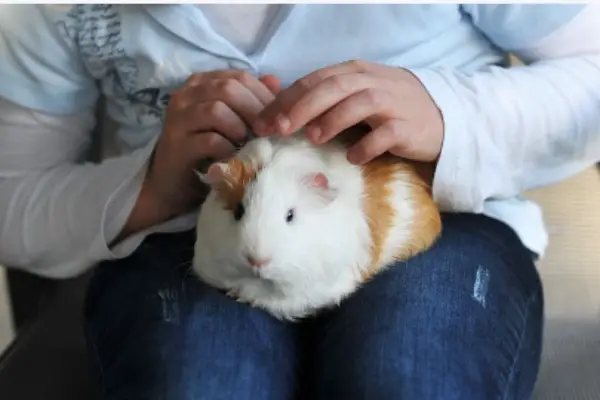
![Can Guinea Pigs Eat Bananas [Helpful Tips] Can Guinea Pigs Eat Bananas](https://petcreeks.com/wp-content/uploads/2022/04/Can-Guinea-Pigs-Eat-Bananas-768x614.jpg)
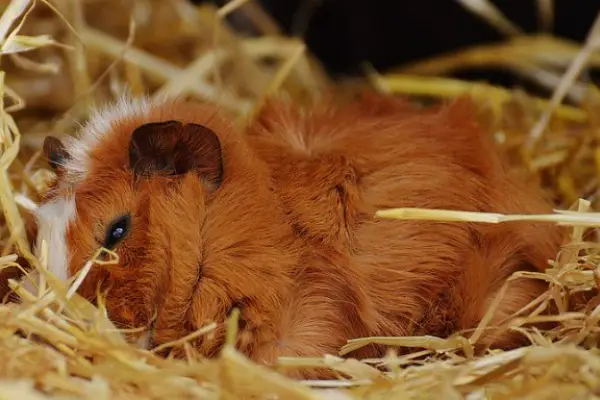
![Can Guinea Pigs Eat Tomatoes [Pros & Cons] can guinea pigs eat tomatoes](https://petcreeks.com/wp-content/uploads/2022/04/can-guinea-pigs-eat-tomatoes.jpg)
![Can Guinea Pigs Eat Cucumber [Pros & Cons] Can Guinea Pigs Eat Cucumber](https://petcreeks.com/wp-content/uploads/2022/04/Can-Guinea-Pigs-Eat-Cucumber-768x614.jpg)
